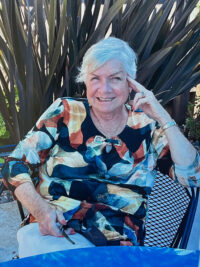“What is a homeless person who finds a home? A person.” — Scott, currently homeless
By Norma Barnett
On February 11, the Sonoma City Council and City Staff held a well-attended public meeting to provide information about the political and financial aspects of homelessness. For those who were there to learn, the official presentation was useful, and after the presentation members of the public were each given two minutes to speak.
Some spoke with compassion for the frightened and angry parents who have had bad experiences with homeless people parked in the Police Department Parking lot that abuts the Field of Dreams, while others spoke about the good work of our local Homeless Programs provided by SOS/The Haven; some criticized the programs, and several defended the work of SOS. Others were just angry and frightened.
Strangely, however, almost no attention was paid to the plight of the homeless. There was no discussion about the adequacy of current programs, no discussion about the fears and anger of the homeless, nor was there any apparent interest in the thoughts and ideas of the homeless about what constitutes an effective program.
Some members of the public described the current homeless services as a “country club program” drawing more homeless to Sonoma, further disturbing and endangering our residents, and tourism. Subsequent local newspaper articles and planning by the City of Sonoma have been focused on the larger community’s sense of safety, which many believe is threatened by the very existence of homeless in our community. Most of these perceptions are based on prejudice and misinformation.
Several people at the meeting accused the Haven of having no screening process, never exiting anyone from services, and never checking Megan’s List for sex offender status. These accusations are blatantly untrue. Participants in the Safe Parking Program, for example, are carefully screened, including vetting through the use of the Megan’s List website. Members of the homeless community who repeatedly create problems can be and are permanently exited from SOS services. In some cases, if they have family elsewhere or need services SOS cannot offer, they are relocated to another city at SOS’s expense.
The particular event which has fueled concern about the danger posed by the homeless was the recent assault of a teenage girl on the bike path by a homeless man. He had been involved for a short period of time with the Haven but was exited for problematic behavior prior to the assault. Of course, my heart goes out to any woman or girl (or boy) who is sexually assaulted. Statistics show, however, that over 80% of sexual molesters are persons known to the victims: fathers, brothers, uncles, grandfathers, neighbors, (mothers—yes, mothers too), boyfriends, and husbands. No evidence suggests that the homeless are frequent perpetrators of sexual crimes.
Both homelessness and sexual crimes are serious social problems, but homelessness does not create sexual predators and sex offenders are seldom homeless. One woman at the meeting spoke of a vicious gang rape that occurred recently in Sonoma that involved a neighbor known to her; let’s not forget the sexual offences by Boy Scout volunteers, at Hanna Boys Center, the physician for the womens’ Olympic Gymnasitcs team, and various wealthy and powerful men.
I have heard homeless people referred to as lazy, irresponsible, choosing to be homeless, manipulative, losers, fragile, and responsible for spoiling the charm, comfort and safety of Sonoma’s citizens. Yet surveys of our homeless population show that the majority are themselves citizens of Sonoma; many were born here, others have lived here for many years.
What are the needs of these homeless citizens? How about a conversation with a homeless person; has anyone asked them what they think of our programs? Has anyone asked any homeless person what ideas they have for better services? Does anyone know what they aspire towards? A job? Being reunited with family? Addiction treatment? Why aren’t we including and learning from the homeless?
Despite the meeting’s expressed intent to address both the concerns of the community and the homeless, it appears that concerns about safety are the primary focus. There are rumors of parents filing lawsuits, and a move to restrict the Haven’s Safe Parking Program.
Except for a Winter Shelter program at the Alliance Church, which provides shelter from November through March each year for 15 homeless people who sleep in sleeping bags on the floor, there is no temporary or permanent housing readily available in Sonoma. Councilmember Rachel Hundley recommends creating a Task Force on homelessness and mentioned many individuals and groups that should be included in this ad hoc group. Excluded only were the homeless themselves.
For such an ad hoc group to be useful, learning about the elements of a good homeless program should include experiences, ideas, and concerns of the homeless themselves. A first rate homeless program requires not just money and resources but an attitude of respect for the homeless and the capacity to treat them as individuals. The homeless have generally experienced life-long trauma, repeated failure, disrespect from the public, poverty, addiction and hunger.
Current innovative programs emphasize “Housing First,” which in Los Angeles, for example, has meant renovating derelict hotels, providing single rooms with door locks for residents, and on-site medical care, addiction treatment, job training, and mental health services to the residents. Some of these programs require participants to work toward independent living and to address problems like addictions. Other models provide housing and on-site services but work on the assumption that the residents themselves are self-determining; given a reliable and safe place to sleep and receive services increases the likelihood of positive change.
Why should we bother with this admittedly troubled population? As Sy Lenz, one of the founders of SOS said, “Because as a community we should care for our citizens.” And some of them are homeless.
Norma Barnett is a Licensed Clinical Social Worker with 40 years experience in social service agencies and private practice






Thank you Norma! As usual, your compassion, intelligence and thoughtfulness help you to rise above the fray to seek real solutions to real problems from the right people without succumbing to fear and misinformation. I will always be grateful for your timely assistance and friendship.